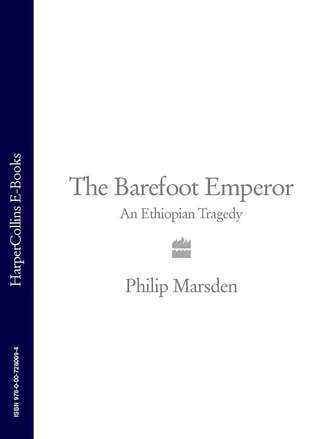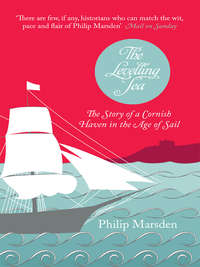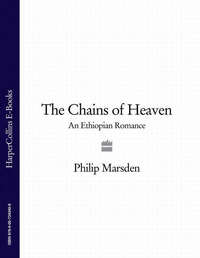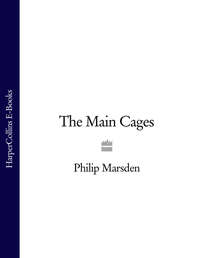
Полная версия
The Barefoot Emperor: An Ethiopian Tragedy
Tewodros, wrote Plowden, ‘is young in years, vigorous in all manly exercises, of a striking countenance peculiarly polite and engaging when pleased, and mostly displaying great tact and delicacy’. Like most observers, Plowden noted his energy. ‘Indefatigable in business, he takes little repose night or day; his ideas are clear and precise; hesitation is not known to him.’
Plowden’s reception showed the value Tewodros placed on ceremony and form. Yet his personal instincts were towards simplicity and equality. ‘He salutes his meanest subjects with courtesy,’ the consul wrote, ‘he is generous to excess and free from all cupidity.’
Tewodros’s plans were common currency in the camp, and Plowden stressed to London how important he could become in the politics of the Red Sea. ‘Next year he will devote to the settlement of Tigray, including the tribes along the coast, and meditates upon the occupation of Massawa.’ He would reclaim Ethiopia’s northern and western borders, the territory annexed by Egypt. ‘Nor does his military ardour hesitate to dream of the conquest of Egypt, and a triumphant march to the Holy Sepulchre.’ In this, as in all his actions, the emperor believed he was merely fulfilling the course of divine will: ‘His faith is signal.’
Plowden’s assessment of Tewodros was not blind to his faults. ‘The worst points in his character are, his violent anger at times, his unyielding pride as regards his kingly and divine right, and his fanatical religious zeal.’ It was, wrote Plowden, ‘impossible for him yet to believe that so great a monarch as himself exists in the world’.
Plowden proposed again the establishment of official relations between the two countries. He offered Tewodros the chance to send an embassy to London, in return for recognition of himself as consul. The treaty signed by Ras Ali contained in it clauses for his successor. So now Tewodros too could claim its benefits: There shall be a firm, mutually cordial and lasting friendship between the king of Abyssinia and his successors and Victoria, the queen of England and her successors …
When Plowden began to talk of this treaty, Tewodros said he knew nothing of it. ‘I am young and inexperienced in public affairs,’ he explained coyly.
So Plowden sketched out the mechanics of a consulship, the rights it gave Tewodros to send his own representation to Queen Victoria, to the court of St James’s, and the principle of mutual exemption from local laws. He spoke of the benefits of such an arrangement, the military aid that would accrue, assistance, trade. Plowden recognised in Tewodros an openness, a yearning for new ideas and contacts. But the emperor’s generals were impatient to return to battle. Every minute Tewodros wasted with this foreigner gave the enemy an advantage.
It was John Bell who relayed the emperor’s reply: I cannot consent to a consul, said Tewodros. I cannot allow anyone in my territory, consul or not, to be free from my jurisdiction. Plowden was devastated – even Ras Ali had agreed to that.
‘For anything else you wish for,’ Tewodros assured him, ‘now and hereafter, for yourself or other English, I shall be happy to perform your pleasure.’
Plowden felt sure that Tewodros would relent in time. He was used to waiting – he would wait a little longer. He travelled to Gondar to sit out the rains.
Tewodros moved his army south, towards the Christian kingdom of Shoa. The king of Shoa died the night before he was due to fight. The arrival of Tewodros with Abune Selama combined with the sudden death of their king to persuade the Christians of Shoa that a new age lay before them, and that Tewodros was its fiery exponent. Shoa was added to Gojjam and Wollo, Begemder and Gondar, Simien and Tigray. The territory of Ethiopia was now larger than it had been for over a thousand years.
8
Tewodros signalled the start of his reign with a series of stirring proclamations.
‘Go now,’ he told his followers, ‘lay down your arms, return to the country of your fathers. Take up the tools of your former trade.’ The merchant will abide in his store, the farmer in his field. He himself – Tewodros, Elect of God – will keep an army and they will be trained matchlockmen, and he will drill them and train them in the use of their arms. Soldiers will be paid and they will buy food from the peasants and no longer plunder farm stores. All guns not in their hands will be smelted into plough-shares and sickle-blades, and in the markets across the land the price of the plough-ox will exceed that of the war horse. Seek out the habits of peace, said the new emperor, live with your family, continue your old peacetime occupation unless it was as a shifta in which case, like Adonibezek who was pursued from the city of Bezek, you will have your hands and feet chopped off.
There shall be no more slavery. Existing slaves must be sold, the money given to charity, and the slaves baptised. Tewodros himself showed the way by buying slaves from the Muslim traders and sending them to priests for baptism. He encouraged others to follow him in formalising their marriage before the priests and to remain faithful to their chosen partners. Women of the camps and of the towns and of tella bets must no longer sell themselves to men. Murderers will not be handed over to the bereaved families for retribution, but dealt with by his own executioners. Tewodros revived the right of all citizens to approach him as the point of final appeal. Long before dawn, the cries of the persecuted surrounded his tent: ‘Jan Hoi! Jan Hoi! Your Majesty! Give me justice!’
He wanted roads. He planned a transport system with Debre Tabor as its hub and spokes pushing out to Gondar, to Meqdela, south to Gojjam. ‘Hitherto,’ wrote one observer, ‘not a single road had ever been constructed.’ The first stages, of route-planning and blasting, were carried out by German missionaries.
Nor did he remain silent on matters of dress. Under the old regime, clothes for the upper body – for man or woman – were a privilege. ‘Childish customs,’ scoffed the emperor, and introduced the wearing of a loose cotton shirt for all. If it reached below the knee, or was of silk, or was brightly coloured and had slashed sleeves, it meant that the wearer had earned the garment in service to the state.
Tewodros’s vision for his country was undeniably a righteous one. Even a man like the Catholic missionary Mgr Justin de Jacobis, driven out of Gondar by Tewodros, recognised, as he fled, the heroic scope of his persecutor’s ambition. Tewodros is ‘extraordinary’, he admitted, the bringer of ‘laws and admirable ordinances of public prosperity and morality’.
Tewodros wanted national unity, and tackled the problem of regional power. During the Mesafint, the provincial rulers had become too powerful, corrupted both by the habit of rebellion and by their alliance with the Oromo rulers. Tewodros (who himself was innocent of neither) ousted these hereditary rulers, and many now shuffled harmlessly around the flat-topped mountains, their hands and legs in chains. Tewodros appointed his own governors.
He was one of the first Ethiopian rulers to take any notice at all of the world outside. He had felt the full force of Egyptian expansion in 1848 at Debarki when a few men had devastated his forces with their guns; Ottoman power in the Red Sea, far to the south of the Bosphorus, was on the wane, and the British and French made no secret of their desire to fill the gap. European politics intrigued him, and he developed a fascination for the war that broke out as he rose to power, that concerned the shrinking of the other end of the Ottoman Empire – the war on the Crimea peninsula. Every visitor was asked for news, for stories of Balaclava and Sevastopol. But Tewodros was baffled by the allegiances. Why in God’s name had France and Britain, who spent their time squabbling around him, been allies in the Crimea, helping the Muslim Turks against Christian Russia?
The future for Ethiopians would no longer be decided only within their own borders. They must learn not only to spare the lives of visiting foreigners, but to see that these strangers might actually bring benefits. He himself was frequently in debate with the two Englishmen, Plowden and Bell.
Plowden left a great deal of written material, but little is known about Bell. Yet it was he who was closest to Tewodros. He had been appointed his liqemekwas, involving among other things dressing as the emperor did in battle, to act as decoy. Bell was given his own detachment of cavalry and married a cousin of Tewodros, Wurqnesh Asfa Yilma. On campaign he often shared a tent with Tewodros and was known to read to him from a copy of Shakespeare with such devotion that the emperor referred to it as ‘Bell’s Bible’.
Tewodros wanted a modern state, a Christian state, without slavery, without feudal fiefdoms, defended by a standing army equipped with up-to-date weapons. More than anything he wanted a Church that did not hold the people in thrall, nor dictate to the crown, nor hoard the tithes from the third of the land it controlled, nor peddle its mysteries in a long-dead language. Plowden in his writings frequently mentions parallels between Ethiopia and medieval Europe. In his quest for unity and centralised rule, Tewodros was attempting ‘a task achieved in Europe only during the reigns of consecutive Kings’; in his taming of the Church his own Reformation. His ideals of worldly power were forged in the heat of the Books of Samuel and Kings yet tempered, with assistance from Bell’s ‘Bible’, by a little European humanism.
But God grants no easy victories. Tewodros’s people had lived for too long in darkness to appreciate at once the light he brought. In Tigray, Niguse and Tesemma, of the family of Wube, rose up against the new regime. In Gojjam, Tedla Gwalu rebelled. Kinfu’s son rebelled. Nor could the Oromo of Wollo yet understand that their years of rule were finished. Across the country, priests too had reservations, strangely slow to see that in Tewodros’s victories was the manifest will of the Almighty.
9
Standing barefoot on the stony earth, with his plain shamma around his shoulder, Tewodros would say: ‘Without Christ, I am nothing.’ He understood his worldly role in terms of biblical precedent. He understood his particular duty as saving Ethiopia’s Christians from extinction by Muslims. He would first convert the Oromo to Christianity, then put the choice to all remaining Muslims in his realm: follow Christ or leave the country. He was not above superstition, seeing portents when they were obviously put in his way. But his zealotry was Christian. He was a crusader, the heir of David, the Elect of God, the dutiful Slave of Christ.
Yet Tewodros didn’t much care for priests. During the Zemene Mesafint many of Ethiopia’s clergy had, according to the chronicles, become ‘polygamists, sorcerers and drunkards’; by day they performed the rites, by night they visited women without husbands. Even worse, they had confused and divided the people with their arguments, squandering the comforts of orthodoxy for baffling schisms. As in the Mesafint of old, when the children of Israel forgot Jahweh and went a-whoring after Baal and all the false gods, so the priesthood had forgotten the one truth.
Foreigners were to blame, at least in part. The Portuguese in the sixteenth century had brought their own interpretation of Christ’s nature and convinced many Ethiopians to adopt it. These ones became known first as Kidat – ‘Unctionists’– then as Yesaga Lij – ‘Son by Grace’– and finally as Sost Lidet or ‘Three Births’, because they said that Christ was anointed in a ‘third birth’. To their detractors the Three-Birthers had therefore to admit the inadmissible: that there was a time when Christ was not fully divine. For traditionalists of the Alexandrian, non-Chalcedonian persuasion, that was a heretical slur on the pure divinity of Christ. These ones referred to the Three-Birthers as Karra Haymanot – Faith-in-the-Knife – because they had sliced the third birth from their teaching.
Tewodros was not interested. He wanted conformity. If the Church was to help in re-unifying the country, it must be unified itself. In 1854, in his first act of statesmanship, he called a council of clergy in Gondar. He was not yet emperor, but having defeated Dejazmach Wube, he now stood with an important ally at his side – Abune Selama.
The abun was the head of the Ethiopian Church, the only bishop in the entire country. The post was never held by an Ethiopian, but always an Egyptian, a Copt appointed by the Patriarchate in Alexandria. Often the incumbent was elderly, unable to speak Amharic, and ignored. In the 1820s, writing about Selama’s predecessor, Dejazmach Sebadagis complained to the Alexandrian patriarch: ‘Was it because you hate Ethiopia that you sent him?’ And as Egypt expanded south under Muhammad Ali, and spread the terror of invasion in Ethiopia, so suspicions of the Coptic abun grew.
Arriving in Ethiopia in 1841, the new Abune Selama was young and ambitious. He was appalled at the spread of Catholic missionaries in northern Ethiopia, and was keen to protect the traditional conformity with Alexandria. In the rise of Tewodros he found someone of like mind, and as vigorous and as determined as himself. At the meeting of clergy in 1854, he and Tewodros outlawed the Three-Birthers, demanding a choice between confession of the Alexandrian creed, or death. They also ordered the expulsion of Catholic missionaries. Shortly afterwards Abune Selama crowned Tewodros and sanctified in church his marriage to Tewabach. Their alliance found its most powerful expression in the invasion of Shoa some months later, when they arrived together at the head of an army.
The fertile alliance between the two men did not last. Abune Selama was too ambitious, too strong-willed, too much like Tewodros himself, for it to be an easy relationship. Antagonisms between them began to multiply. The clergy too began to grumble about the speed of Tewodros’s reforms. After the rains of 1856 he called another gathering of clergy in Gondar, to persuade them of the need to tax some of their vast wealth.
‘Our enemies are many,’ Tewodros told them. ‘It is only fair that some of this should go to feed those who protect us all.’
The clergy also needed to eat, he was told. And anyway, there were more of them than of his soldiers. ‘What you should do,’ said one priest, ‘is take your army from one province to the next, allowing each one to recover its reserves of grain.’
‘That’s how it’s always been, Your Majesty,’ explained another. ‘It’s the custom.’
Neither side conceded anything. In the end the priests fetched the Fetha Negest, the ‘Book of the Law of Kings’, and read: ‘That which is taken to the Holy of Holies should not be taken out.’ From which was understood, it was not in anyone’s power to relinquish Church land.
‘This book,’ fumed the emperor, ‘has been translated a thousand times and interpreted in a thousand ways! If you want to put another on the throne, do so. And like the Oromo rulers I will continue to plunder the beasts and the fields of the people!’
He turned and left, and the priests watched his guards close around his back.
As quick as Tewodros’s anger was his remorse. Later he called Abune Selama to him, and the two men agreed a compromise. The priesthood would accept Tewodros’s right to tax them, and Tewodros would agree not to exercise the right.
And the next day the priests led a joyful procession through the streets of Gondar. The city was filled with the sound of the kebbero and the debteras’ sistra and the songs of Moses. Tewodros had failed. The expansion of his rule had, for now, reached its limit at the gates of the church. He returned to campaigning.
10
Several months later, on 27 December 1856, the Coptic Patriarch Cyril IV – spiritual father of the Ethiopian Church – rode into Gondar. He had travelled for months from Alexandria. His men ran ahead of him, through the stony streets of the old capital, in and out of the juniper shadows, shooing all women from the slightest possibility of meeting his gaze.
The patriarch’s journey to Ethiopia was one of the most significant moments of Tewodros’s early reign. Cyril turned out to be the highest-ranking foreigner ever to reach the emperor, and his visit forced the imperial hand in his initial choice of overseas allies. It also revealed in public for the first time the extremes of Tewodros’s personality.
It began well enough. Tewodros received His Holiness in Debre Tabor with great ceremony and genuine deference. But as the days passed the emperor began to spot blemishes in the heavenly mantle of the primate. He heard Cyril’s muttering about his daughter Church, the inappropriate worship of the cross and of the saints, about how full the Ethiopian calendar was of fast days and holy days. For a man whose thoughts seldom strayed from matters of the spirit, the patriarch also appeared very keen to inspect the imperial forces. At the same time Tewodros received reports that Egyptian war-camels were gathering on his western border, and that Said Pasha himself, viceroy of Egypt, was in the Sudan. Suddenly all became clear to Tewodros – the patriarch’s visit was a ploy by the pasha to check Ethiopia’s weakness before invading. What should he do?
Tewodros imprisoned the patriarch. He locked him up in a house with his bishop Abune Selama and placed a hedge of thorns around it. During the days that followed, loyalties polarised sharply. Many Ethiopians were horrified at Tewodros’s sacrilege, and were quick to blame the other foreigners, the European Protestants. In turn, Tewodros turned to his ‘children’, Plowden and Bell, for support, and they saw a chance to press for a direct approach to Queen Victoria and Britain.
But the suggestion angered Tewodros. ‘Do you suppose me capable of fear, that I would use such a moment?’
‘I don’t believe the pasha would ever become the aggressor in the face of our protests,’ stressed Plowden.
Tewodros clung to his belief in the Protestants. With the Copts still imprisoned, he stood in court one day trying to explain his stance. Pointing to a pair of Protestant missionaries, he addressed the sceptics: ‘They seek our welfare, and have brought us Bibles and Testaments in our own language. But the holy father has come as a merchant and ambassador, asking us for wax and ivory and mules and zebal, and for friendship with the Mohammedans.’
He reminded them of the urgency and integrity of his own mission. ‘I am Christ’s servant. He gave me victory over all my enemies. I am labouring for His honour, to protect our Church against Muslims.’
They should trust him as their leader. ‘As long as I have life, I will keep down the patriarch, the abun and Said Pasha – even the Queen of England, should she help him.’
Yet between Tewodros’s suspicions and the detained churchmen, his people had made their choice. Both Tewodros and his Protestant friends found themselves marginalised.
Some days later, the emperor called a much larger assembly – courtiers, ministers, missionaries, foreigners. A thousand priests and debteras joined them, thousands more of his own troops. This time he stood before them not in defiance, but to confess: it was the devil who had made him abuse the churchmen in this way. He sent a message to the thorn-rounded house, pleading for reconciliation. When it was granted, he went to kneel before the patriarch and the abun and begged their forgiveness.
Before returning to Egypt, Cyril IV left a tiny seed to take root in Tewodros’s mind. Europeans, he said, were not to be trusted, their motives were selfish. Earlier he had urged Tewodros to expel the Protestants. Now he told the emperor quite plainly that the English merely wanted his friendship in order to ‘undermine his power and conquer his country’.
At the time Tewodros refused to believe it. But in years to come, as he tried to understand the ambiguous signals of British diplomacy, he often found cause to recall that patriarchal warning.
11
When Cyril left for the lowlands, Tewodros sent him off with personal gifts of ivory and, for Said Pasha, ‘three excellent and four average horses’, as well as some spears and a dagger. He also enclosed two letters in his saddlebags – one to the pasha, the other to Queen Victoria. It was his first foray into foreign relations.
Within eleven days the letter to Said Pasha passed from Amharic to Arabic. Its date changed from the Ethiopian 5 Hidar 1850 (13 November 1857 in the Gregorian calendar) to the Hejira 25 Rabi’ al-Awwal. The address was buffed up from the plain Amharic of Tewodros – ‘my friend Sa’id Pasha, the ruler of Egypt’– to the Arabic: ‘to His Highness, the most noble, the magnificent pleasure, and the true lover of God, Muhammad Sa’id Pasha, Protector of the Land of Egypt. May he continue to be preserved through the care of the Lord of Creation.’
The text itself reflected the turnaround in Tewodros’s attitude to Egypt. Glossing over his own furious imprisonment of Cyril, he wrote: ‘When I was told by my father the patriarch that you love me and want my friendship, I was very happy … May God increase our friendship.’
The letter to Queen Victoria was unembellished, and more neutral. He probably wouldn’t have sent it at all had Plowden not encouraged it. The consul was keen to preserve his own ambitions in the light of Tewodros’s new friendship with Cyril and Egypt:
May this letter sent by the King of Kings Tewodros of Ethiopia reach the queen of England, Biktorya. How are you? Are you well? I am well, thank God … I have received your envoy Buladin [Plowden] with love and friendship. It is because I have not found rest and [matters] have not settled down for me that I have not written until now. Now, you are the child of Christ and I am the child of Christ. For the love of Christ, I want friendship …
It was Plowden who was now isolated. He accompanied Tewodros’s letter to the queen with an explanatory one of his own. He stressed how finely balanced not only Tewodros’s interest in the British was, but also his entire rule. It was imperative to offer material support to Tewodros. Plowden was aware that only a year earlier the Egyptians had granted a licence to the French to build a canal at Suez. Now the French were trying to wrest Ethiopia from Tewodros: ‘The French and the Roman Catholic mission have already spent large sums to enable, if possible, his adversary Dejazmach Niguse to rival him and three cannon are now at Massawa for that purpose.’
To help save the Red Sea from French control, Plowden suggested to the Foreign Office that they send Tewodros a few hundred muskets and percussion caps – also a ‘handsome piece’ for the emperor’s own use.
In London Plowden’s long letter received a scribbled, single-word minute from Lord Clarendon: Approve. C.
The first reply to the two letters came from Egypt. An ambassador from Said Pasha arrived in Ethiopia with a long train of mules behind him, heavy with gifts for Tewodros – one hundred double-barrelled guns, numerous tents and silks and bolts of cloth – and four large cannon.
Meanwhile, from Lord Clarendon’s desk, Plowden’s plea for arms snailed its way to the War Office. A year passed. The War Office amended Plowden’s order, and a docket was filled out by a Mr Moore at the Tower:
Rifle with rammer and implements……………………………..1
Cone and screw-driver for Deane’s revolver………………..1
Case………………………………………………………………………………1
That was all. The War Office considered it ‘inappropriate’ to send arms to Tewodros at that moment. On 5 October 1859 – two years after the letters had left Ethiopia – Plowden at last received news of the request from his agent on the coast: ‘The rifle has been received, but no ammunition.’
Plowden’s position had become precarious. Four and a half years previously he had come up to the highlands on a brief visit to the new ruler. As British consul he was not only friendless now but surrounded by murmurs of hostility. The Ethiopians had reverted to their old suspicion of European Christians, and his way out of the country was blocked by the rebel Niguse. Walter Plowden was trapped.





